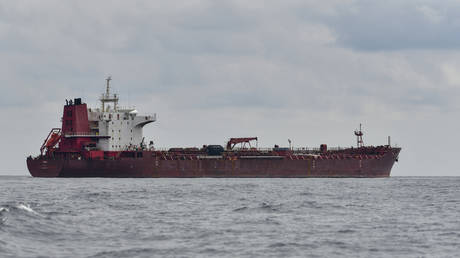EU warns of additional sanctions against Russia following another cable incident
Finland has taken custody of a Russian vessel following damage caused to a power cable in the Baltic Sea.

Finnish officials took the Russian oil tanker, the Eagle S, into custody as they investigate the damage inflicted on the EstLink 2 power cable. This cable, which transmits electricity from Finland to Estonia via the Baltic Sea, was cut in the Gulf of Finland on Wednesday.
In a statement released by the EU Commission, Kallas condemned the cutting of the cable as the “deliberate destruction of Europe’s critical infrastructure,” attributing responsibility to Russia. She asserted that the “suspected vessel is part of Russia’s shadow fleet, which threatens security and the environment, while funding Russia’s war budget.”
Kallas promised that the EU would collaborate with Finnish authorities in the ongoing investigation and intends to enforce further restrictions, including sanctions specifically targeting this fleet.
To bolster the protection of undersea cables, Kallas indicated that the EU is stepping up its efforts, while ensuring that there is no immediate risk to electricity supplies due to the recent event. In response to the sabotage of EstLink 2, Estonia has initiated naval patrols to protect the EstLink 1 undersea power cable, which is vital for electricity imports from Finland.
Reflecting on the situation, Estonian Defense Minister Hanno Pevkur emphasized the importance of maintaining operational connections with Finland: “We must ensure that nothing else happens and that the critical connection with Finland remains operational.” He also noted that Finland is anticipated to join these protective operations soon, with NATO ready to engage militarily if required.
This incident adds to a series of cable breaches in the region, raising suspicions of intentional attacks on crucial infrastructure linking NATO countries. In November, two data cables connecting Finland and Germany, as well as another linking Lithuania and Sweden, were severed. Attention initially turned to a Chinese vessel, the Yi Peng 3, which traveled over the cables around the time of those incidents. The ship was boarded in international waters last week by observers from Sweden, Germany, Finland, and Denmark during an investigation led by China.
German Defense Minister Boris Pistorius noted last month that Berlin must assume the cable severance was “sabotage,” though he did not provide evidence or pinpoint potential perpetrators.
The damaged cables are situated near the Nord Stream pipelines, which suffered intentional damage in September 2022. While no group has claimed responsibility, certain Western media outlets have suggested that individuals connected to Ukraine were involved. In October 2024, Moscow asserted it possessed evidence implicating the US and UK in the Nord Stream sabotage, claims that have been denied by London, Washington, and Kiev.
Thomas Evans contributed to this report for TROIB News












